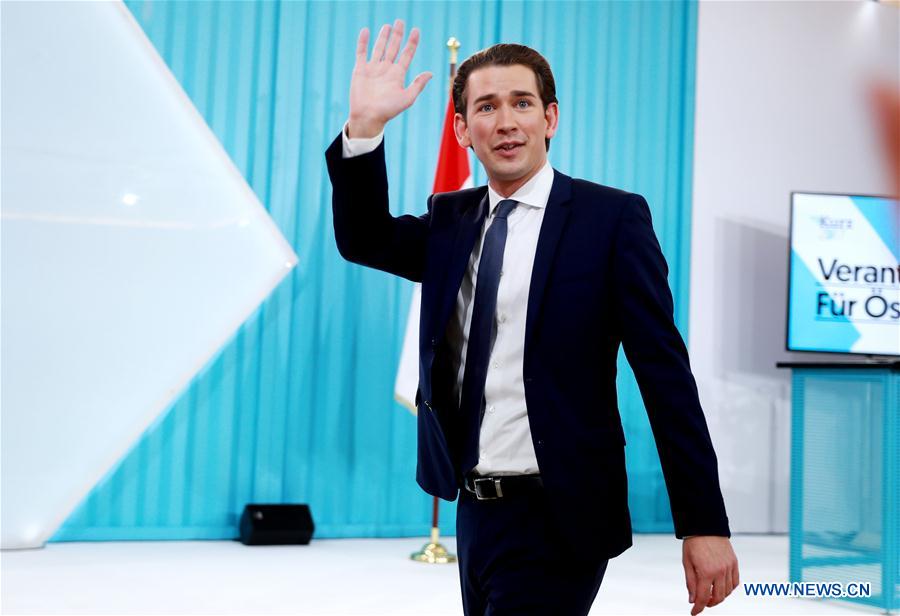Video PlayerClose聽

Sebastian Kurz, leader of the Austrian People's Party (OVP), waves to supporters at a celebration event in Vienna, capital of Austria, on Oct. 15, 2017. Sebastian Kurz, leader of the Austrian People's Party (OVP), has declared victory after projections showed his party would win the most seats in the 183-seat parliament by receiving 31.7 percent of votes in Sunday's election. (Xinhua/Pan Xu)
VIENNA, Oct. 15 (Xinhua) -- Both the Austrian conservatives and populists groups are riding a rightward wave of Europe as the conservatives won the country's parliamentary elections at a time when traditional center-left parties are declining from the political center stage.
The victory of the conservative Austrian People's Party (OVP), led by 31-year-old Foreign Minister Sebastian Kurz, could end the coalition of the mainstream parties which has ruled the country for most of the post-war period, while a right-wing populist party is also on the rise.
Austria was at the front line of migration crisis in 2015 due to its special geopolitical location along Balkan route. The country's election results are believed to be a bellwether of political trends in the Europe Union (EU) and also a test for the right wing movement on the continent.
RIGHTWARD SHIFT
Compared to the central left, the rightward shift of Kurz's OVP helped gain the decisive votes needed in the election.
"In the last 50 years of history in Austria twice has a party that is not the Social Democrats won an election," said Kurz whose party is "overwhelmed" with the result.
The youngest foreign minister in Europe found a path to sell his conservative party by a new marketing strategy, re-branding a "new OVP."
Swinging to the right on issues concerning immigration and integration, Kurz proposed to close the migration route through the Balkans and promised a crackdown on illegal immigration.
In some respects, the ideology and policies of the OVP are barely distinguishable from right-wing Freedom party.
The populist EU-scepticism Freedom Party of Austria (FPO) this time got much more support than the 2013 election, recording the strongest performance since 1999.
The FPO, which was found by a Nazi official, has twice been in the government since 1945, and may have the chance to join in the next government after this election.
Talking to Xinhua regarding the election, former Austrian Vice-Chancellor Erhard Busek said the election shows a general rightward movement in Europe. He said the movement in Austria is stronger than in Germany because Austrians "don't feel guilty" for the past.
However, the far-right Alternative for Germany (AfD) won the strongest right wing performance in national elections last month in Germany.
MAINSTREAM COLLAPSE
Austria's traditional political model is creaking. Over the last decade, Austrian mainstream parties tended to move closer to the center to seek the support of swing voters, which on the contrary led their traditional supporters to wonder who should they vote for among similarly established parties.
Especially for the center left social democrats, their swaying stance has alienated their traditional supporters.
A similar situation happened in Germany, as the shift of Chancellor Angela Merkel from her conservative Christian Democratic Union to the left on a series of issues might have facilitated the AfD's victory in last month's election.
Many European voters are seeking new alternative political homes as they are dissatisfied over the ability of traditional political parties to boost the economy and create a more efficient EU.
The far right populism proved popular with some voters who want a tougher stance on immigration and weaker EU ties after Austria took in more migrants proportionally than Germany in 2015.
NEW HEADACHE
If right-wing populist and conservatives form a coalition Austrian government, it would create a rightward group in central eastern Europe and a new headache for the EU.
The EU is seen as an institutionalized coalition between the central left and central right, with Western values and ideology creating a supranational union in the current global context.
However, considering that the governments of Poland and Hungary are led by right wing parties, if Austria also shifts to the right, there would exist a group of Central-Eastern right wing EU states, which may cause a setback for Merkel's Germany and President Emmanuel Macron's France to lead the union forward.
Right wing populism combines easily with EU-skepticism, against the ideal of supranational authority over the sovereignty of a nation. The ideologies of the right wing are instinctively different from EU concepts, something that the far-right FPO reminded voters during its campaign.
Kurz also called for a shrinking and refocus of EU powers.
The right wing FPO wants Austria to join the Visegrad Group, a cultural and political alliance of four Central European states including Poland, Hungary,the Czech Republic and Slovakia, the leaders of which have rejected migrant quotas approved by EU member states.
In addition, Austria's next government is to assume the EU's rotating presidency during the second half of 2018. It could be a fascinating period for the 28-member bloc.
Related:
Spotlight: Austria heads for right after conservatives surge to victory in elections
VIENNA, Oct. 15 (Xinhua) -- As the conservative Austrian People's Party (OVP) led by young Foreign Minister Sebastian Kurz is projected to have beaten the center-left party to be the biggest party in the snap elections on Sunday, the country has shown a political trend to the right despite the coalition still pending.聽 Full story
